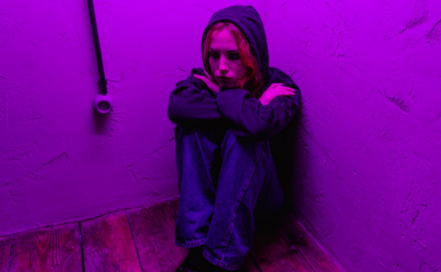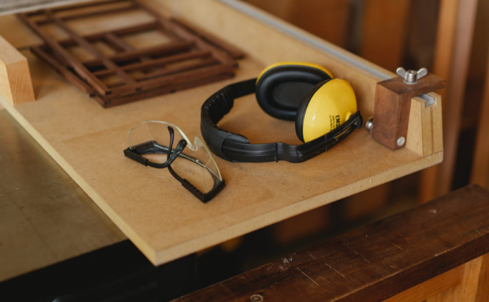 Stephen Geller Katz LCSW-R
Stephen Geller Katz LCSW-R
Misophonia Cognitive Retraining Therapy
 Stephen Geller Katz LCSW-R
Stephen Geller Katz LCSW-RMisophonia Cognitive Retraining Therapy
Misophonia Cognitive Retraining Therapy, as featured on the MTV True Life episode: “I Have Misophonia” premiering Friday, December 16th, 7:00 PM EST. See Clip >
|
|
|
| Moderate to severe anxiety triggered by chewing sounds, including: | ||
|
|
|
You may also be affected by visual stimuli, such as repetitive foot or body movements, fidgeting or movement you observe out of the corners of their eyes. Intense anxiety, rage and avoidant behavior may develop as a result of misophonia.
 * Do you feel your family and friends don’t understand how much you suffer?
* Do you feel your family and friends don’t understand how much you suffer?
* Do you often feel you can just suffer through a social event where there is eating present only to find that you must “escape” before you have a panic attack?
* Do you find that some people are at first understanding and make some efforts not to make the triggering sounds in front of you, but soon forget and constantly have to be reminded, causing you to feel angry, anxious and depressed?
* Are you avoiding social activities that you enjoy because of the misophonia?
* Are you fearful of losing your job and/or is the misophonia effecting your job performance?
You may be a candidate for Misophonia Cognitive Retraining Therapy, or MCRT.
Stephen Geller Katz, LCSW-R, with over 20 years of clinical experience, a New York University graduate, developed Misophonia Cognitive Retraining Therapy and founded Misophonia Cognitive Center™ in response to the growing number of people with Misophonia coming to his private practice from audiologists and ENTs. He discovered that by helping people to retrain and reinterpret the thoughts around their Misophonia, anxiety and depression symptoms began to improve. But even more important so did the Misophonic trigger response.
In this blog post, we will explore the relationship between misophonia and PTSD, and discuss strategies for managing symptoms. Misophonia is a condition that involves a strong emotional response to specific sounds, known as trigger sounds. PTSD, or post-traumatic stress disorder, is a mental health condition that can develop after a traumatic event. While misophonia and PTSD are distinct conditions, they can sometimes occur together, which can make managing symptoms more challenging.

While misophonia and PTSD are distinct conditions, they can sometimes occur together. In fact, research has suggested that misophonia may be more prevalent among individuals with PTSD than in the general population.
The relationship between misophonia and PTSD is not fully understood, but it is believed that the emotional reactivity associated with both conditions may be linked. Additionally, individuals with PTSD may be more likely to develop misophonia as a result of hyperarousal and emotional dysregulation.
 Managing symptoms of misophonia and PTSD can be challenging, but there are strategies that can be helpful. Some specific strategies that may be effective for managing misophonia and PTSD symptoms include:
Managing symptoms of misophonia and PTSD can be challenging, but there are strategies that can be helpful. Some specific strategies that may be effective for managing misophonia and PTSD symptoms include:
CBT is a type of talk therapy that can be helpful for managing symptoms of both misophonia and PTSD. CBT involves identifying negative thought patterns and behaviors and replacing them with more positive and adaptive ones. This can help individuals develop coping strategies for managing misophonia and PTSD symptoms and improve overall well-being.
Exposure therapy is a type of therapy that involves gradually exposing individuals to trigger sounds or other stimuli that cause emotional distress. This type of therapy can be helpful for individuals with misophonia and PTSD, as it can help desensitize individuals to trigger sounds and reduce the emotional impact of those sounds over time.
MBSR is a type of therapy that involves mindfulness meditation and other mindfulness-based techniques to manage stress and anxiety. This type of therapy can be helpful for managing symptoms of misophonia and PTSD, as it can improve emotional regulation and reduce the impact of trigger sounds on daily life.
Misophonia and PTSD are two distinct conditions that can sometimes occur together, making managing symptoms more challenging. However, with effective treatment and support, it is possible to manage misophonia and PTSD symptoms and improve overall well-being. Strategies such as Cognitive Behavioral Therapy (CBT), exposure therapy, and mindfulness-based stress reduction (MBSR) can be effective for managing symptoms of misophonia and PTSD.
If you or a loved one is struggling with misophonia and PTSD symptoms, Dr. Katz and the Misophonia Cognitive Center™ can provide effective treatment and support. Our online therapy sessions, including Cognitive Behavioral Therapy (CBT) and other evidence-based therapies, can help you manage symptoms and improve overall well-being.
Don’t let misophonia and PTSD control your life. Contact Stephen Katz at the Misophonia Cognitive Center™ today to learn more about our services and schedule an appointment.
MISOPHONIA COGNITIVE CENTER ™
Stephen Geller Katz LCSW-R
19 West 34th Street
New York, NY 10001
646-585-2251
When a person suffers from PTSD or Post Traumatic Stress Disorder, they might find it difficult to handle the intensity of some sounds. Perhaps they develop phonophobia, which is a fear of sound, or they might get misophonia – an aversion to certain sounds. In this article, we will discuss the relationship between PTSD and misophonia. But first, let’s understand what both these conditions mean.

(Source)
This is a mental health condition that is triggered because of a terrifying event. This condition relates to traumas and includes symptoms such as nightmares, flashbacks, and severe anxiety. Furthermore, a person suffering from PTSD will find it hard to control their thoughts because of an event.
Many people suffering from traumatic events might find it difficult to cope with situations. Even so, recovery is possible. All they need is some time and proper self-care. Their symptoms can last as long as a month or a year, depending on how they adapt to the situation. If they don’t make appropriate life changes to handle the condition, it will negatively impact their ability to function in day-to-day tasks properly. Therefore, it is important to seek appropriate treatment to reduce the symptoms and improve function.
Symptoms of post-traumatic stress disorder begin within a month of the event. But, a person may not notice the symptoms until a year later. The symptoms negatively influence work and social situations. Moreover, their behavior with their partner may also change after the event. Also, the symptoms interfere with the normal daily task. PTSD symptoms fall under four types:
The symptoms and interval of the phase may vary from person to person.
People with misophonia cannot tolerate some sounds. Certain sounds can cause their brain to react negatively, which is reflected in their behavior. While others may not notice the sound, a person with misophonia may find it triggering. Examples of these sounds include chewing, yawning, and breathing. Furthermore, the brain may elicit a fight-or-flight response, which forces them to escape or show anger. There are only a few facts known about this condition, so it is hard to understand the mechanism and treatment. People with misophonia feel embarrassed talking about their inability to tolerate sounds. To avoid their aggressive reaction, they usually stay isolated. Most people develop misophonia at the age of 12, but due to a lack of awareness, they may not understand what they’re experiencing.
As discussed above, misophonia involves negatively reacting in response to triggering sounds. According to many experts, misophonia and PTSD are similar conditions, where stimuli can cause triggering effects. Because of the similarities, many experts are taking into account the qualities of PTSD to understand misophonia. The person suffering from PTSD doesn’t need to always show a fight or flight response. They can also experience unsteadiness, dreams, flashbacks, and mood swings. The core issue in this condition is an event, whereas in misophonia, the cause is a triggering sound.
The difference between both conditions can be the aftermath of the stimuli. Other than triggers, the person’s reaction is different in both cases. For instance, when a person suffers from PTSD, they have bad dreams and develop negative emotions. However, with misophonia, a person losses their temper and experiences anxiety. But, there are some similarities as well.

(Source)
In both conditions, the person reacts because of certain triggers. Some researchers also suggest that Misophonia relates to distressing and traumatic events as well. The fight or flight response is due to the stimuli that their mind has already set. In order words, the triggers that a person cannot tolerate are due to an event that their brain isn’t letting go of. Perhaps, that is why each person reacts to different triggers. When they hear that specific sound, their brain elicits a survival response to move them away from danger.
If you experience any of the above conditions, you need to visit a professional audiologist or a specialist in sound disorders. When you visit a misophonia specialist, you can find a technique or therapy that relieves your response to triggering sounds.
Schedule an easy online session with the Misophonia Cognitive Center™ from anywhere in the world at 646-585-2251 today.